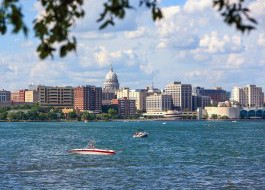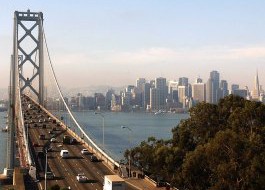 It's a good time to put down roots in the Bay Area.kropic1/ShutterstockThe best way to build wealth is to prioritize assets over income. But ensuring that your assets outweigh your liabilities can be impacted greatly by the city you call home.
It's a good time to put down roots in the Bay Area.kropic1/ShutterstockThe best way to build wealth is to prioritize assets over income. But ensuring that your assets outweigh your liabilities can be impacted greatly by the city you call home.
This week, online personal finance consultant Bankrate.com released a report ranking America's best and worst metro areas for building wealth.
To create the list, Bankrate.com ranked the 21 largest metro areas in five categories that contribute directly to an individual's ability to build their wealth:
Savable income: average income after taxes and expenditures
Human capital: unemployment rate, educational opportunities, and productivityDebt burden: non-mortgage debt per capita and average credit scoreHomeownership: average annual change in home prices, foreclosure actions, and homeownership rateAccess to financial services: Percentage of workers with access to retirement plans
San Francisco came out on top as the best place to build wealth, followed by Minneapolis and Washington, DC.
“In some metro areas, like San Francisco, homeownership can be prohibitively expensive, but higher-than-average salaries can help residents stash more money away in tax-advantaged retirement accounts," wrote Claes Bell, a Bankrate.com analyst and the author of the study. "On the other hand, Minneapolis-area residents don't earn as much, but the area's affordable housing and recovering real estate market provide opportunities to build wealth over the long term through home equity."
Read on to see how the 21 largest US cities stack up for building wealth, as well as the average savable income, homeownership rate, and non-mortgage debt per capita for each city.
21. Riverside-San Bernardino, California
Savable income: $9,790
Homeownership rate: 62.6%
Debt burden: $27,682
20. Miami
Shutterstock / Richard Cavalleri Savable income: -$3,613*
Homeownership rate: 58%
Debt burden: $25,645
*Analysis showed a negative average savable income for the Miami metro area. This may be attributable to the high population of retirees in the area who are spending more of their savings than they're earning.
19. Tampa-St. Petersburg, Florida
Shutterstock / Bonnie Fink Savable income: $3,437
Homeownership rate: 62.7%
Debt burden: $27,015
18. Atlanta
Savable income: $2,503
Homeownership rate: 62.1%
Debt burden: $28,259
17. Houston
Savable income: $6,117
Homeownership rate: 59.1%
Debt burden: $29,571
16. Los Angeles
Savable income: $7,246
Homeownership rate: 46.5%
Debt burden: $25,147
15. San Diego
Savable income: $2,692
Homeownership rate: 52.1%
Debt burden: $26,266
14. Dallas
kan_khampanya/Shutterstock Savable income: $9,177
Homeownership rate: 59.1%
Debt burden: $29,204
13. New York
Savable income: $11,981
Homeownership rate: 49.5%
Debt burden: $25,687
12. Chicago
Richard Cavalleri/Shutterstock Savable income: $11,966
Homeownership rate: 62.7%
Debt burden: $27,594
11. Philadelphia
Savable income: $9,714
Homeownership rate: 65.2%
Debt burden: $26,822
10. Baltimore
Savable income: $9,303
Homeownership rate: 66.9%
Debt burden: $27,917
9. Phoenix
Savable income: $14,828
Homeownership rate: 63.2%
Debt burden: $27,811
8. Denver
Savable income: $13,099
Homeownership rate: 61.1%
Debt burden: $28,007
7. Boston
Songquan Deng/Shutterstock Savable income: $5,115
Homeownership rate: 55.1%
Debt burden: $26,318
6. Seattle
Savable income: $10,381
Homeownership rate: 55.4%
Debt burden: $27,691
5. Detroit
Savable income: $12,513
Homeownership rate: 71%
Debt burden: $23,610
4. St. Louis
Savable income: $10,451
Homeownership rate: 66.2%
Debt burden: $27,486
3. Washington, DC
Savable income: $15,246
Homeownership rate: 64.2%
Debt burden: $28,914
2. Minneapolis
Savable income: $6,557
Homeownership rate: 68.6%
Debt burden: $26,877
1. San Francisco
Savable income: $16,657
Homeownership rate: 53%
Debt burden: $25,941
 It's a good time to put down roots in the Bay Area.kropic1/Shutterstock
It's a good time to put down roots in the Bay Area.kropic1/Shutterstock
























